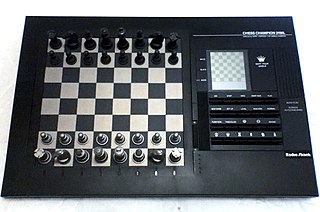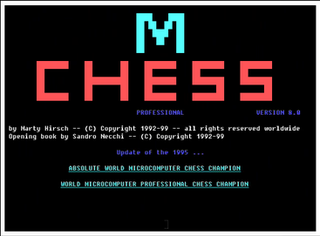
Computer chess includes both hardware and software capable of playing chess. Computer chess provides opportunities for players to practice even in the absence of human opponents, and also provides opportunities for analysis, entertainment and training. Computer chess applications that play at the level of a chess grandmaster or higher are available on hardware from supercomputers to smart phones. Standalone chess-playing machines are also available. Stockfish, Leela Chess Zero, GNU Chess, Fruit, and other free open source applications are available for various platforms.
ChessBase is a German company that develops and sells chess software, maintains a chess news site, and operates an internet chess server for online chess. Founded in 1986, it maintains and sells large-scale databases containing the moves of recorded chess games. The databases contain data from prior games and provide engine analyses of games. Endgame tablebases are also provided by the company.

In computer chess, a chess engine is a computer program that analyzes chess or chess variant positions, and generates a move or list of moves that it regards as strongest.

HIARCS is a proprietary UCI chess engine developed by Mark Uniacke. Its name is an acronym standing for higher intelligence auto-response chess system. Because Hiarcs is written portable in C, it is available on multiple platforms such as Pocket PC, Palm OS, PDAs, iOS, Microsoft Windows and Mac OS X.

Fritz is a German chess program originally developed for Chessbase by Frans Morsch based on his Quest program, ported to DOS, and then Windows by Mathias Feist. With version 13, Morsch retired, and his engine was first replaced by Gyula Horvath's Pandix, and then with Fritz 15, Vasik Rajlich's Rybka.
Robert Morgan Hyatt is an American computer scientist and programmer. He co-authored the computer chess programs Crafty and Cray Blitz which won two World Computer Chess Championships in the 1980s. Hyatt was a computer science professor at the University of Southern Mississippi (1970–1985) and University of Alabama at Birmingham (1988–2016).

Zappa, Zap!Chess or Zappa Mexico, is a UCI chess engine written by Anthony Cozzie, a graduate student at the University of Illinois at Urbana-Champaign. The program emphasizes sound search and a good use of multiple processors. Earlier versions of Zappa are free and the current version is available at Shredder Computer Chess.
Fruit is a chess engine developed by Fabien Letouzey. In the SSDF rating list released on November 24, 2006, Fruit version 2.2.1 had a rating of 2842. In the CEGT rating list released on January 24, 2007, Fruit version 2.2.1 had a rating of 2776.

Rybka is a computer chess engine designed by International Master Vasik Rajlich. Around 2011, Rybka was one of the top-rated engines on chess engine rating lists and won many computer chess tournaments.
This article documents the progress of significant human–computer chess matches.
Computer shogi is a field of artificial intelligence concerned with the creation of computer programs which can play shogi. The research and development of shogi software has been carried out mainly by freelance programmers, university research groups and private companies. By 2017, the strongest programs were outperforming the strongest human players.
ChessGenius is the name of a chess-playing computer program written by Richard Lang who has in the past written programs that have won the World Computer Chess Championship on 10 occasions.

MChess Pro is the name given to a chess playing computer program written by Marty Hirsch which won the World Microcomputer Chess Championship in 1995. The program is no longer under development and is no longer commercially available and therefore has largely historical significance only.

Stockfish is a free and open-source chess engine, available for various desktop and mobile platforms. It can be used in chess software through the Universal Chess Interface.

Houdini is a UCI chess engine developed by Belgian programmer Robert Houdart. It is influenced by open-source engines IPPOLIT/RobboLito, Stockfish, and Crafty. Versions up to 1.5a are available for non-commercial use, while 2.0 and later are commercial only.

Komodo and Dragon by Komodo Chess are UCI chess engines developed by Komodo Chess, which is a part of Chess.com. The engines were originally authored by Don Dailey and GM Larry Kaufman. Dragon is a commercial chess engine, but Komodo is free for non-commercial use. Dragon is consistently ranked near the top of most major chess engine rating lists, along with Stockfish and Leela Chess Zero.

AlphaZero is a computer program developed by artificial intelligence research company DeepMind to master the games of chess, shogi and go. This algorithm uses an approach similar to AlphaGo Zero.

Leela Chess Zero is a free, open-source, and deep neural network–based chess engine and volunteer computing project. Development has been spearheaded by programmer Gary Linscott, who is also a developer for the Stockfish chess engine. Leela Chess Zero was adapted from the Leela Zero Go engine, which in turn was based on Google's AlphaGo Zero project. One of the purposes of Leela Chess Zero was to verify the methods in the AlphaZero paper as applied to the game of chess.

CuckooChess is an advanced free and open-source chess engine under the GNU General Public License written in Java by Peter Österlund. CuckooChess provides an own GUI, and optionally supports the Universal Chess Interface protocol for the use with external GUIs such as Arena. An Android port is available, where its GUI is also based on Peter Österlund's Stockfish port dubbed DroidFish.






